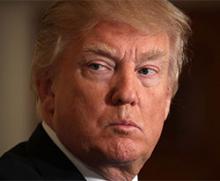
President Donald Trump on Thursday swung through The Villages --- friendly territory amid an impeachment inquiry --- to announce health-care plans and, in the process, give Gov. Ron DeSantis a political boost.
“If he was doing a lousy job, I probably wouldn’t have shown up today. But he is doing one of the best jobs in the whole country --- Ron DeSantis,” Trump told the crowd in the Central Florida retirement mecca, which is a reliable Republican stronghold.
DeSantis is a longtime Trump ally who benefited from the president’s endorsement when he ran for governor last year. The fact that the governor owes much of his success to Trump was not lost on the president.
“I was honored to be very much involved in that campaign,” he told the crowd.
Amid the U.S. House impeachment inquiry, which Trump called “pure corruption,” DeSantis and his wife, First Lady Casey DeSantis, were on hand with the president and other supporters including Republican Congressmen Ross Spano and Daniel Webster.
Most of Trump’s speech covered his administration’s health-care agenda and slammed the proposals of Democratic presidential candidates, which he characterized as socialist pitches.

In addition to the executive order, Trump also touted two issues that have been a central part of DeSantis’ health-care agenda: a prescription-drug importation plan and repealing the “certificate of need” regulatory program.
“We will soon allow the safe and legal importation of prescription drugs from other countries including the country of Canada,” Trump said. “Stand up, Ron. Boy, he wants this so badly.”
The Trump administration in July announced a pair of rules that would allow Florida to move ahead on its drug-importation efforts. In part, the administration proposed a rule that would allow drug importation from Canada on a demonstration basis and conditionally certify that the importations would not put the public at risk.
Another rule would allow manufacturers to import versions of Food and Drug Administration-approved drug products sold in foreign countries, if the manufacturers can prove the drugs are the same as the U.S. versions. The rules could take months to pass.
Meanwhile, the state Agency for Health Care Administration needs $25 million to hire a vendor that is required to, among other things, develop the list of drugs with the highest potential for cost savings to the state.
“In a little while, your governor is going to be able to go out and negotiate, ‘til his heart is content. And he is going to go to Canada --- I know he is going there already --- and he is looking at their pricing … and he is going to get his drug price to a price that you won’t believe,” Trump said Thursday.
The governor’s office did not immediately respond to requests for comment about DeSantis’ travel plans.
Prescription drug costs are a top priority for senior voters, a lot of whom reside in The Villages.
The president also told the crowd that other states should follow Florida’s example in repealing the certificate of need regulatory program, an idea some Republican legislative leaders pushed for years.
While it was DeSantis who got the praise Thursday, the drug importation program and the certificate of need repeal were proposals pushed during the spring legislative session by House Speaker Jose Oliva, R-Miami Lakes. Under the certificate of need program, hospitals in the past have needed state approval before they could build facilities or add certain programs.
Lawmakers this spring eliminated so-called CONs for general hospitals, complex medical rehabilitation beds and services such as heart and lung transplants effective July 1. Specialty hospitals will be deregulated effective July 1, 2021.
Florida is one of eight states nationwide that have eliminated CONs for hospitals but maintain the program for other providers such as nursing homes, according to a legislative analysis of the law. Twelve states have eliminated CON requirements across the board.
Aside from health care, the president Thursday also praised DeSantis for his efforts in bringing federal aid to communities ravaged by Hurricane Michael nearly a year ago, Next week will be the one-year anniversary of the devastating storm, which has left parts of Northwest Florida in a long-term recovery.


